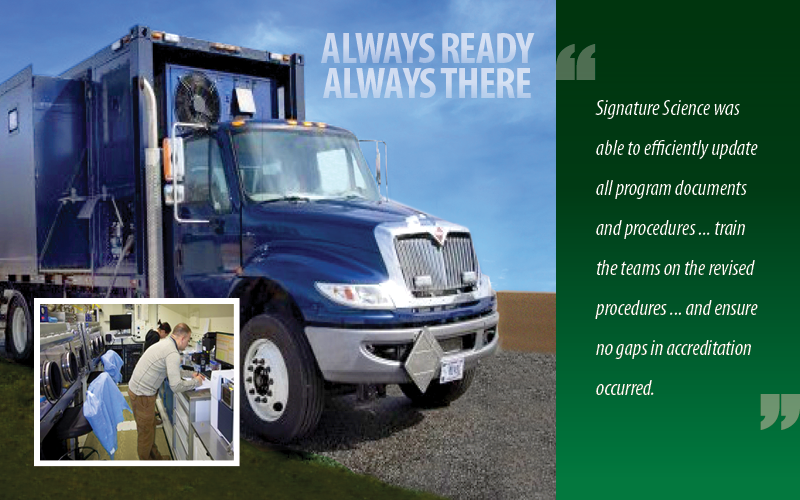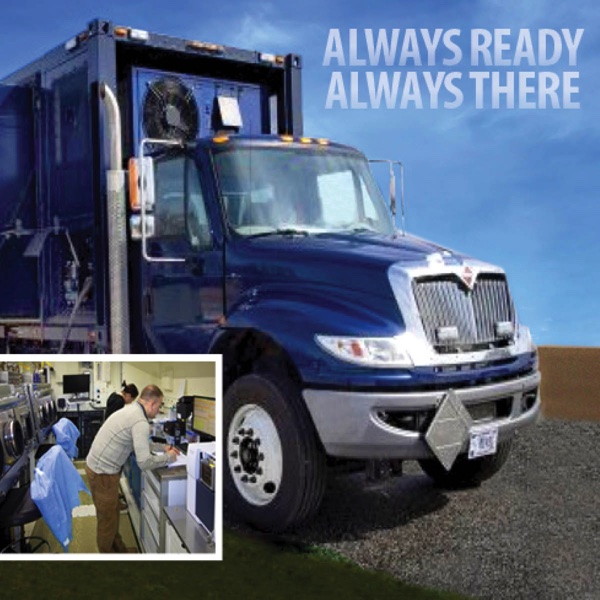
Ensuring the quality of mission response now and into the future
- Always Ready, Always There
- An ISO 17025 Accreditation Solution
- Program Highlight: Proficiency Testing
- Program Updates: A Smooth Transition
In 2006, the National Guard Bureau (NGB) launched an initiative to pursue ISO 17025 accreditation for the Weapons of Mass Destruction‒Civil Support Team (WMD-CST) laboratories to help ensure that the analytical laboratory system (ALS) analytical capability embodies the NGB’s motto of “Always Ready, Always There.” Specifically, the accreditation supports the WMD-CST mission by standardizing analytical tactics, techniques, and procedures (TT&P) and enforcing scientific rigor in an operational environment that is necessarily geared toward providing rapid answers to life and death questions in the most chaotic environments imaginable. Signature Science’s team of quality assurance experts developed the quality program that enabled and supported accreditation for the WMD-CSTs.
Always Ready, Always There.
The NGB’s WMD-CSTs are 57 specialized, active duty, full-time Guard units operating under federally-approved CBRNE response doctrine and are individually certified by the Secretary of Defense. Each WMD-CST fields a fully equipped mobile ALS in addition to sophisticated satellite communications systems; command and control systems; and chemical, biological, and radiological survey and monitoring equipment.
The mobile ALS is designed for on-scene sample processing and analysis for rapid identification of chemical and biological threat agents and other related hazards (e.g., TICs and TIMs). The objective is to quickly provide an incident commander with the information needed to make command decisions involving protection of life, health, and property. Two to four members of each team, including a Science Officer, are trained to operate the ALS instrumentation and perform on-site analyses for a wide variety of sample types and matrices.
An ISO 17025 Accreditation Solution.
Development of a comprehensive quality program for the NGB WMD-CSTs presented a number of unique challenges—above and beyond those that might be encountered in accreditation of a commercial laboratory.
Challenge: Navigating the complexity of a joint state and federal military command structure comprising 57 CSTs and the NGB’s CST Program Office, together with equipment procurement and supply chains belonging to the DoD Joint Program Office, and training responsibilities spread among several other DoD entities.
Solution: Close collaboration with NGB and the accrediting body (American Associated for Laboratory Accreditation, A2LA) was necessary to overcome this challenge.
Challenge: Ensuring each analyst is proficient with a variety of chemical, biological, and microscopical methods and instrumentation. Unlike a commercial laboratory that analyzes hundreds of samples a day using standardized methods for method-specific target analyte lists, WMD-CSTs might analyze only a handful or fewer samples for a given response action, but the variety of sample types and the possible targets are almost unlimited.
Solution: Implementation of a comprehensive, monthly proficiency test program that includes tests for all operators across all methods and matrices was essential to addressing this challenge.
Program Highlight: Proficiency Testing.
A key feature of the overall accreditation effort is the analytical proficiency testing (PT) program developed specifically for the WMD-CSTs and tailored to their mission. The program, developed and conducted under Signature Science’s ISO 17043 PT provider accreditation, encompasses the full suite of ALS analytical capabilities. It includes GC-MS, FTIR, PCR, ECL, and polarized light (PLM) and fluorescent microscopy methods in liquid, powder, soil, solid, sludge, vegetation, and wipe matrices. It also addresses the teams’ radiological analysis capabilities.
This program includes one PT round per month and all ALS operators participate in each round to practice their analytical skills, gain confidence in their analytical abilities, and identify potential training needs. Further, the PT assessment process includes an in-depth skills evaluation that helps operators understand why they may have missed components of interest in a test sample or had other technical or quality issues. The program also offers insight into strengths and weaknesses at the WMD-CST unit and Program levels.
Program Updates: A Smooth Transition.
Maintaining and improving the quality system developed for the WMD-CSTs is critical to program success. In 2017, the ISO 17025 accreditation standard was updated. Signature Science was able to efficiently update all program documents and procedures to meet the requirements of the new version of the standard (ISO 17025:2017), train the teams on the revised procedures, and ensure there were no gaps in accreditation for any of the 57 WMD-CSTs.
Beginning in spring of 2019, NGB started fielding new mobile laboratories to the WMD-CSTs, including new instrumentation. As these new laboratories have come on line, updates to quality program procedures have been made to ensure no accreditation gaps occur as the teams receive the updated equipment. Close collaboration with A2LA and NGB have helped ensure a smooth transition.

Leslie Kearby, PMP, CQA
Senior Staff Chemist
If you are looking to bolster the success of your CBRNE detection mission
For more than 15 years, Leslie Kearby has provided technical leadership on Signature Science’s CBRNE Quality Assurance-focused projects and currently leads the Quality Assurance Services Contract with the National Guard Bureau WMD-CSTs’ Analytical Laboratory System group. She also serves as the Project Manager for Signature Science’s HazMatPT™ Program and Subject Matter Expert for custom proficiency testing program development.

